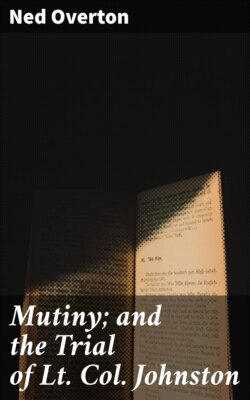Читать книгу Mutiny; and the Trial of Lt. Col. Johnston - Ned Overton - Страница 5
На сайте Литреса книга снята с продажи.
JOHNSTON BEFORE BLIGH.
ОглавлениеTable of Contents
GEORGE JOHNSTON was born at Annandale, Dumfrieshire, Scotland, on the 19th of March, 1764. On the 6th of March, 1776, he obtained a commission as second lieutenant of the 45th company of marines. During the years 1777 and 1778, he was stationed at New York and Halifax. On the 27th of April, 1778, he was promoted to the rank of first lieutenant in the 91st company. In the years 1779 and 1780, he was employed recruiting in England. In 1781, he was despatched to the East Indies, and remained there until December, 1785. During this period he served on board H.M. ships Sultan and Worcester, and on four occasions was in action with the French fleet. In one engagement, he was severely wounded. He served under Earl Percy, who, after succeeding to the dukedom of Northumberland, became a patron of Johnston. In January, 1786, he obtained leave of absence for six months, and on resuming duty was attached to headquarters. Towards the end of the year, he was transferred as first lieutenant to the detachment of marines intended to form the garrison for the settlement at Botany Bay. In December, he embarked on board the Lady Penrhyn, a transport in the first fleet. When Governor Phillip examined Port Jackson in January, 1788, it is claimed that Johnston was the first man to land in that harbour. During the first twelve months of the settlement, Johnston acted as adjutant of orders to Governor Phillip. After the death of captain Shea, on the 2nd of February, 1789, he received the command of the vacant company as captain-lieutenant. In 1790, he was in command of the marines on detached duty at Norfolk Island. In 1791, the detachment of marines was relieved by the New South Wales Corps, and at the same time was given the option of being discharged or of remaining in the colony. Many availed themselves of the privilege, and were enlisted in an auxiliary or fifth company in the corps. Johnston, who had returned from Norfolk Island with the marines, took command of this company, and a commission as captain was issued to him on the 25th of September, 1792. He was one of the first land-owners from the class of officers, and was granted 100 acres at Annandale by lieutenant-governor Grose on the 12th of February, 1793. In January, 1796, he was nominated by Governor Hunter to relieve Philip Gidley King in the command at Norfolk Island, but owing to ill-health he was unable to fulfil this duty. In the following September he was appointed aide-de-camp to the governor. In 1800, Johnston received his brevet rank as major. In the same year he was placed under arrest by lieutenant-colonel Paterson on charges of "paying spirits to a serjeant as part of his pay at an improper price, contempt, and disobedience of orders." He protested against trial by court martial in the colony, and his objection was upheld by Governor Hunter, who, in consequence, ordered him to England under arrest. He sailed in October, 1800, on H.M.S. Buffalo. In England his trial was quashed.* He returned to the colony on the 14th of December, 1801, on board the transport Minorca, but it was not until the 17th of October, 1802, that he was released from arrest and his reconciliation with lieutenant-colonel Paterson was announced.**
[* See page 270, volume III.][** See page 322, volume IV.]
Lt. Col. George Johnston State Library of Victoria pic 0-1994726
In January, 1803, Johnston took the temporary command of the New South Wales Corps during the illness of lieutenant-colonel Paterson. At this time inquiries and courts martial were being held in connection with certain libellous pipes about Governor King which had been circulated. These involved the governor in serious disputes with the military. During a court martial on Anthony Fenn Kemp, of which Johnston was president, John Harris, the judge-advocate and prosecutor, was charged with "scandalous infamous behaviour" in disclosing the votes of members at previous courts martial. Thereupon the court martial on Kemp was adjourned, and the trial of Harris demanded by Johnston.*** The results of this action seriously interfered with the administration of the colony, and a bitter correspondence **** ensued. Johnston demanded the appointment of a judge-advocate in place of Harris. This request was strongly resisted by King, but he ultimately gave way "to Secure the Peace of the Colony by the Criminal Courts not continuing suspended for want of Members to compose it and on no other consideration." This conflict between the military and King has a remarkable similarity to the final dispute between the military and Bligh. The action taken by Johnston was extremely doubtful. The papers that are available do not demonstrate how far his action was due to his personal initiative, how far to the instigation of a party behind him, as the papers in his actions against Bligh do.
[*** See page 177, volume IV.][**** See page 177 et seq., volume IV.]
In March, 1804, Johnston commanded the military sent in pursuit of the convicts who had risen in rebellion at Castle Hill. He acted with great courage and daring when he encountered the rebels at Vinegar Hill, and completely routed them. When lieutenant-colonel Paterson was detailed for the command of the settlement at Port Dalrymple, in 1804, the command of the New South Wales Corps devolved on Johnston, and he retained it until the arrival of lieutenant-colonel Foveaux, on the 28th of July, 1808. On the 1st of January, 1806, he received his commission as major.
